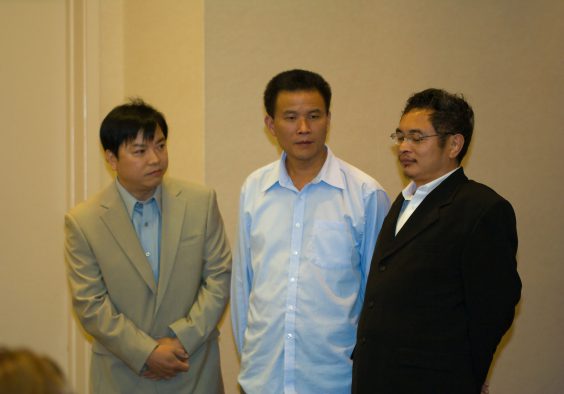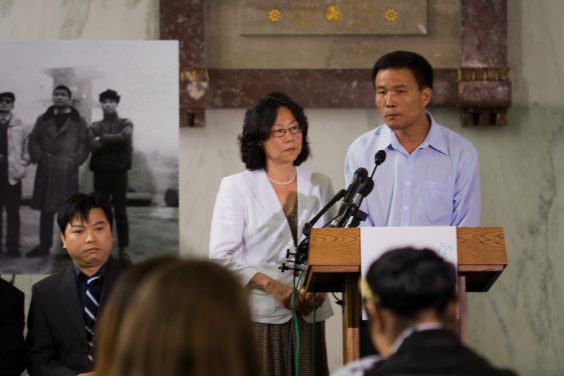The Death of a Behavior Artist
by Tienchi Martin-Liao / April 17, 2017 / Comments Off on The Death of a Behavior Artist

The “Mao Portrait Protestors” (Yu Zhijian, Lu Decheng, & Yu Dongyue) at Capitol Hill in 2009
In response to a widespread discontent with government corruption and social inequality in 1989 post-Mao China, student activists formed organizations that would later become the pro-democracy movement. Challenging the absolute authority of the Chinese Communist Party, three students from the Hu’nan province defaced a portrait of Mao in defiance.
The gigantic portrait of Mao Zedong has been hanging on Tiananmen gate ever since the People’s Republic founding in 1949. It symbolizes absolute power; it is the sanctum, the talisman of the Chinese Communist Party (CCP). No citizen should ever challenge its divinity. Yet in the pro-democracy movement in 1989, when three young men from Hu’nan province traveled to Beijing to join the mass protest, they believed that all the illnesses of Chinese society– the corruption, the nepotism, and the stagnated political reform– were deeply rooted in the personal worship of Mao Zedong as the almighty god who led the country to its current state as Death Valley or “no man’s land.”
At that time, the student and protesters only shouted slogans –down with the corrupted officer, down with the bureaucrat profiteering— but they did not dare touch the authority of the CCP, let alone the godfather of CCP himself. When the student leaders brought up the appeal and protest letter to premier minister Li Peng, in front of the Great Hall of the People they kneeled down like subjects or slaves, not like fighters.

- During the Cultural Revolution, people were sentenced to death or outright murdered because of one wrong sentence. In China today writers do not lose their lives over their poems or articles; however, they are jailed for years. My friend Liu Xiaobo for example will stay in prison til 2020; even winning the Nobel Peace Prize could not help him. In prison those lucky enough not to be sentenced to hard labor play “blind chess” to kill time AND TO TRAIN THE BRAIN NOT TO RUST. Freedom of expression is still a luxury in China. The firewall is everywhere, yet words can fly above it and so can our thoughts. My column, like the blind chess played by prisoners, is an exercise to keep our brains from rusting and the situation in China from indifference.

- Tienchi Martin-Liao is the president of the Independent Chinese PEN Center. Previously she worked at the Institute for Asian Affairs in Hamburg, Germany, and lectured at the Ruhr-University Bochum from 1985 to 1991. She became head of the Richard-Wilhelm Research Center for Translation in 1991 until she took a job in 2001 as director of the Laogai Research Foundation (LRF) to work on human rights issues. She was at LRF until 2009. Martin-Liao has served as deputy director of the affiliated China Information Center and was responsible for updating the Laogai Handbook and working on the Black Series, autobiographies of Chinese political prisoners, and other human rights books. She was elected president of the Independent Chinese PEN Center in October 2009 and has daily contact with online journalists in China.
It was then that the three men from Hu’nan broke the myth of authority and breached the political taboo.
Yu Zhijian, 25, a school teacher, Lu Decheng, 22, a bus driver, Yu Dongyue, 21, a journalist and art critic, had prepared eggs filled with color and threw them at the portrait of Mao, where they then hung this couplet: “Terminate the five thousand years of dictatorship, ending of the personal cult.” The stunned students were not inspired by their bold act; they instead circled and arrested them, handing the group over to the police. After the crackdown and massacre at Tiananmen Square, the three men were consequently sentenced to life, 20, and 16 years of imprisonment. The youngest, Yu Dongyue, suffered from insanity in jail and was released after 16 years and nine months. Lu Decheng, after nearly nine years, left the jail and fled successfully through Thailand and settled down in Canada. Yu Zhijian, after 11 and half years behind bars, also fled together with Yu Dongyue out of the country and the US granted them asylum.
In the summer of 2009, the three were invited to meet with American politicians and give a speech. Yu Zhijian told the public that it broke his heart to see that his younger comrade Dongyue had lost his mind to the inhumane torture. Dongyue always took a soldier’s post, or kneeled down, to anyone wearing a uniform. All three of them have lost their family, social contacts, and are penniless. Yu said firmly however that he never regrets what he and his friends have done. Should the same political situation arise again, he would do the same thing.

Yu Zhijian delivers his speech to American politicians in 2009
The writer Liao Yiwu interviewed Yu Zhijian in 2006. Liao called Yu a behavior artist. In the interview, Yu describes the time of Mao Zedong’s death in 1976; he was a 12 year old schoolchild and competed with his classmates to see who could cry the loudest. When he later became a student, his chemistry major did not excite him and instead he got lost in literary world, reading lots of western poetry from Heine, Byron, etc. He started to communicate with other intellectual friends, quit his job as school teacher, and became interested in the current happenings in society. When the democracy movement broke out in Beijing in Spring 1989, the three friends organized a group of active, young people in their home town Liuyang. When the Beijing students started the hunger strike, the local activists decided to go to Beijing to support the heroic action. The interview provides valuable details how the young people from the province participated in the central protest movement in Beijing and how the political naivety brought the protesters the unavoidable death.
The three men from Hu’nan showed certain maturity in their thinking. Through their courageous deeds, they set up a posture of independence and awakened a spirit of suspicion, overturning blind obedience and submissiveness to the authority. Looking back at the history, their action was doubtless a great contribution to the movement as it destroyed the deification of Mao. Yet fortune has not favored the three heroes. After the long sentence, Lu lives in exile in Canada and the two Yu’s live in Louisiana; Yu Zhijian has to work hard to make a living to raise his family and to support his friend with mental disorder. They have a rather simple but peaceful life. On March 30, when Yu’s wife posted the news of the death of her husband, the Chinese dissident community in overseas was shocked; they had almost forgotten their comrades. Yu Zhijian died at age 53, leaving behind a seven-year-old son, a wife as well as his ill and dependent comrade—Yu Dongyue—far away from their homeland and country.




